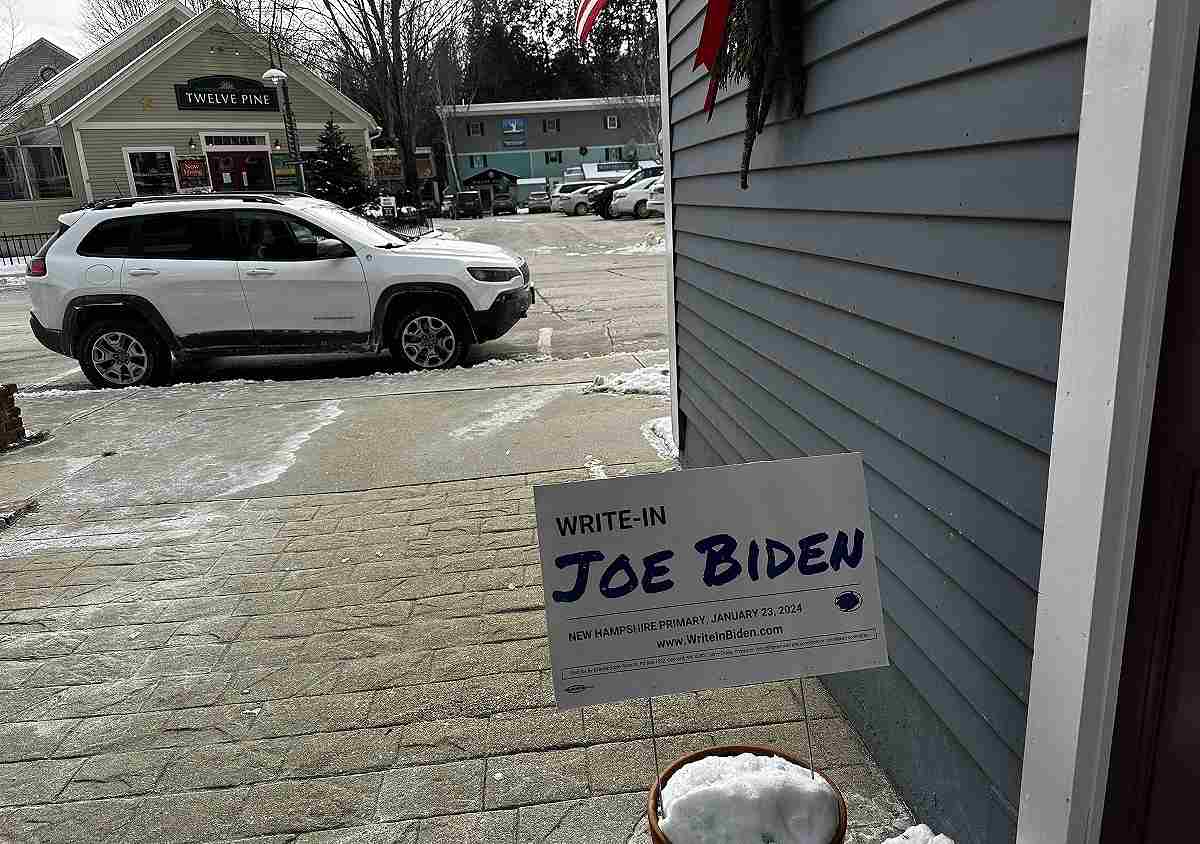
A sign suggesting that voters write in Joe Biden on their New Hampshire ballots on Jan. 20.
17:02 JST, May 24, 2024
Steve Kramer, a Democratic operative who admitted to commissioning an artificial intelligence-generated robocall of President Biden that instructed New Hampshire voters to not vote early this year, is now facing criminal charges and federal fines.
New Hampshire Attorney General John Formella announced on Thursday that Kramer had been indicted on charges of felony voter impression and misdemeanor impersonation of a candidate. He faces a total of 26 counts across four counties based on the residences of 13 New Hampshire residents who received the calls.
The Federal Communications Commission also announced Thursday that it would propose fining Kramer $6 million for violating the Truth in Caller ID Act. The FTC also proposed a $2 million fine for Lingo Telecom, a carrier that put the AI calls on the line.
In a statement, Formella said that he hopes the federal and state enforcement actions “send a strong deterrent signal to anyone who might consider interfering with elections, whether through the use of artificial intelligence or otherwise.”
FCC Chairwoman Jessica Rosenworcel said in a statement that the actions were “only a start,” because “AI technologies that make it cheap and easy to flood our networks with fake stuff are being used in so many ways here and abroad.”
On Wednesday, Rosenworcel also shared a proposed FCC regulation that, if approved, would consider whether to require disclosures when there is AI-generated content in political ads on radio and TV.
Kramer, who worked for Dean Phillips – the long-shot Democratic presidential candidate who ended his campaign in March – told The Washington Post in February that he produced the AI-generated robocall. Kramer claimed he created the robocall to raise awareness about the dangers AI poses in political campaigns.
Kramer did not respond to requests for comment.
The robocall, which went out the weekend before the New Hampshire primary, sounded like a digitally generated voice impersonating Biden that advised people not to vote on Tuesday, according to complaints that the New Hampshire attorney general had said it was investigating in January.
The call, which began with a catchphrase of Biden’s, calling the election “a bunch of malarkey,” told voters: “It’s important that you save your vote for the November election.”
Biden was not on the ballot in the New Hampshire Democratic presidential primary, but a group of Democrats organized a campaign to write in his name to show support for the incumbent.
“Voting this Tuesday only enables the Republicans in their quest to elect Donald Trump again,” the robocall said, according to an audio recording provided by a Write-In Biden organizer. “Your vote makes a difference in November, not this Tuesday.”
Phillips, who has denied any involvement in the robocall, said in a statement after Kramer’s indictment that the case “is a canary in the coal mine.”
“Congress must take immediate steps to manage the nefarious use of artificial intelligence before it surely manages us,” he continued.
Kramer told The Post in February that he sent out the call to “just under 5,000” people listed as the “most likely Democrats” to vote in the New Hampshire primary.
In early February, Formella announced a criminal investigation into the matter, and sent a telecom company, Life Corp., a cease-and-desist letter ordering it to immediately stop violating the state’s laws against voter suppression in elections.
The incident highlights the ease and accessibility by which AI-generated technology is making its way into the 2024 campaign cycle, posing a new challenge for regulators seeking safeguards against potential election interference.
A multistate task force was also prepared for potential civil litigation against the company, and the FCC ordered Lingo Telecom to stop permitting illegal robocall traffic, after an industry consortium found that the Texas-based company carried the calls on its network.
The FCC issued him a subpoena for his involvement, according to Kramer. And after the robocall, the FCC adopted a ruling that clarified generating a voice with AI for robocalls is illegal and swiftly issued a cease-and-desist letter to Kramer for “originating illegal spoofed robocalls using an AI-generated voice in New Hampshire.” It issued a public notice to U.S.-based voice providers regarding blocking traffic related to the call.
Top Articles in News Services
-

Survey Shows False Election Info Perceived as True
-

Hong Kong Ex-Publisher Jimmy Lai’s Sentence Raises International Outcry as China Defends It
-

Japan’s Nikkei Stock Average Touches 58,000 as Yen, Jgbs Rally on Election Fallout (UPDATE 1)
-

Japan’s Nikkei Stock Average Falls as US-Iran Tensions Unsettle Investors (UPDATE 1)
-

Trump Names Former Federal Reserve Governor Warsh as the Next Fed Chair, Replacing Powell
JN ACCESS RANKING
-

Producer Behind Pop Group XG Arrested for Cocaine Possession
-

Japan PM Takaichi’s Cabinet Resigns en Masse
-

Man Infected with Measles Reportedly Dined at Restaurant in Tokyo Station
-

Israeli Ambassador to Japan Speaks about Japan’s Role in the Reconstruction of Gaza
-

Videos Plagiarized, Reposted with False Subtitles Claiming ‘Ryukyu Belongs to China’; Anti-China False Information Also Posted in Japan


























